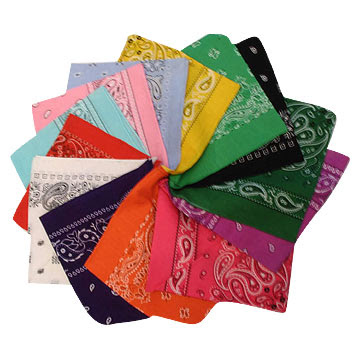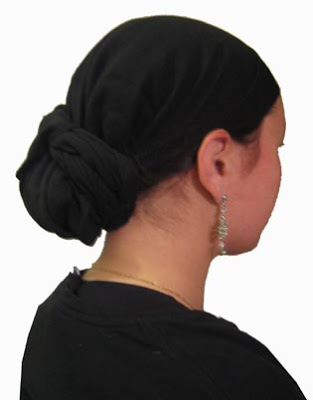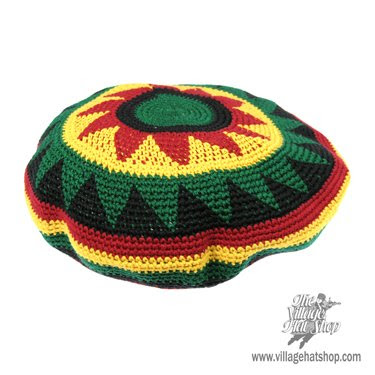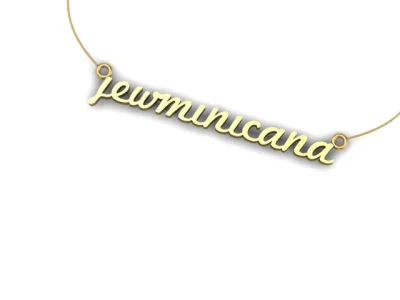
 (I like these except for the fact that if you’re Hispanic and wearing the wrong color, you could get shot at in the ghetto.)
(I like these except for the fact that if you’re Hispanic and wearing the wrong color, you could get shot at in the ghetto.)
I just stood there stunned, mouth half opened, defenses down. I had just finished what I thought was a good speech on the story of my conversion and I hadn’t expected to be attacked, not in this way. And I wondered: Didn’t he see the brown and white poka dot headband/bandana I had carefully picked out this morning or had my head covering totally been swallowed up by my curly afro? It wouldn’t have been the first time this had happened.
 (Exhibit A: Bulbous head.)
(Exhibit A: Bulbous head.)
Before I converted, I practiced covering my hair. I was studying at a school in Israel and I battled the Jerusalem heat by whisking my afro away into a head scarf. It didn’t even matter too much that because my hair was so big (never long) I looked like a cross between Marge Simpson or the alien from the Sigourney Weaver movies with its equally bulbous head.
 (Yea, that’s pretty much what I look like, eh?)
(Yea, that’s pretty much what I look like, eh?)
And when I finally got married, I went into frenzied shopping for head coverings. I noticed the ones I liked on my married friends and other congregants at shul and I bought them by the dozen. But when the head coverings arrived, they didn’t fit. In a beret, it looked like a mushroom was growing out of my head. The head scarves wouldn’t cover my mass of curly locks. And worst, no matter what I used to cover my head, my hair became brittle, broken and misshapen. I was embarrassed to uncover my hair in front of my husband.
So I shaved it.
I made a joke about it to my husband beforehand and then I went and actually did it. I went to a Dominican hair salon much like the ones my mother had taken me to every week to straighten every curl on my head ever since the moment around my third birthday when she noticed aghast that I had “bad hair.” I’ll never forget those hair stylists from my childhood who protested that my hair was too wild to tame and overcharged my mother every visit. They made cutting comments about my “bad hair” as they blew it straight with hair dryers that burned my ears.
So after about a month of being married, I got a buzz cut. The woman at the hair salon protested. She said my hair was too gorgeous to cut off. I didn’t even pause to let it sink in. This was the first and only Dominican woman who had every complimented my hair. My great-grandmother, my grandmother, my mother had all nearly died of heart attacks when I rebelled against their racist regime by refusing to straighten my hair at age 16. I spent the years after fighting off their disgusted glares and comments that whittled away at my self-esteem. 
(Oh, the sadness when I realized I couldn’t contort my hair into this hair scarf pretzel.)
My husband nearly passed out when he saw my nearly bald head. He didn’t think it was attractive. He missed every blessed curly lock. His friends tried to console him while my hair grew back. And when it finally did, he made me promise never to shave it again.
A year passed by, a year of bad hair days and ill-fitting hair coverings, before I finally returned to a hair stylist, a curly hair specialist who cooed over my natural, never been dyed, never been straightened, mane. But in the midst of cutting it, she noticed that the hair on the top of my head was thinning. She said she’d seen it before in other Sephardic clients who covered their hair. She explained my hair was too thin, too fine, and too fragile to be covered constantly. I was dazed. Now, my hair wasn’t just ugly from covering it, I was losing it too?
But I wouldn’t stop covering my hair. No, never that. So I took to wearing headbands and bandanas that let my hair breathe.
I tried to ignore the comments my friends murmured from under their sheitels at weddings where they wondered aloud if “that was how I was covering my hair now” and “why don’t you just straighten it or cut it?”

Incidentally, I had worn a sheitel once and discovered that much like many hats even the roomiest sheitels could not fit over my massive hair. Incidentally, I had discovered that when I covered my whole head people assumed I was born Jewish, Sephardic even, and they were more likely to make racist comments in front of me because they were sure there was no one in the room (surely not an undercover Hispanic girl) to offend. And when I showed just a little bit of hair, I watched as people stared pointedly at my hair before they asked me if I had converted to Judaism.
So, yes, in case you missed it, I am miserable.
How have I managed to go from family members putting me down for what naturally grows on my head to being put down by Jewish women (and men) who think my head coverings are insufficient? Why was I explaining that my head coverings often cause fibromyalgia flare-ups that lead to mind-blowing pain across the nerves on my scalp? Why was I even bothering to explain myself to anyone? Why did I need their acceptance?
There don’t seem to be any easy options. I can cover my hair and keep losing it. I can cover my hair and keep suffering. I can cover my hair any which way and there will always be someone to judge me for my decisions, someone to decide that my choice that day (scarf? Rasta beret? headband? bandana?) is either too religious or not religious enough.
But I don’t want to be miserable so I think it’s about time I got some cojones and spoke up.
How I cover my hair is between me and G-d! How I cover my hair is my business, not yours! And just in case you missed that last memo, butt the hell out of my business. Oh, and just so you know, I will not be responsible for my actions if you ignore this warning. If you really need someone to judge, start by looking in the mirror.

If I may say so: Print the text from this blog post, carry a few copies around with you in your purse, and if someone comes up to youremaking your headcovering, just give him a copy and leave him reading.As you said – your headcovering is between you and HaShem..
LikeLike
<>(I like these except for the fact that if you’re Hispanic and wearing the wrong color, you could get shot at in the ghetto.)<>Just saying that made me laugh out loud.
LikeLike
Also <>(Oh, the sadness when I realized I couldn’t contort my hair into this hair scarf pretzel.)<>Really? Wow. It’s such a cute style too.
LikeLike
the best part of this post are the captions to the pictures!i think Kathrin has a good idea
LikeLike
I like that you were able to be funny throughout the anger and you have every right to be angry. Your modesty should empower you and it’s not for anyone else it’s for you and G-d. Keep doing what you’re doing and I love your blog.
LikeLike
Aliza,I empathize with you, but I can’t agree with your comment, “How I cover my hair is my business, not yours!” You have made yourself into a public figure (in fact one who wrote an article about her personal feelings on her hair-covering…essentially making it the entire world’s business), and whether you like it or not, one that represents Orthodox Judaism.As an Orthodox public figure I think it is justified that you explain why your hair-covering meets Jewish Law. Are you not a role model for other Jewish women?You went to great lengths to allude to the personal reasons why you do not cover your hair fully…how about going the whole nine yards and explain your religious reasoning (if you have one).
LikeLike
Aliza, when you move to Israel, choose a community like Modi’in. In our modern Orthodox synagogue head coverings range from thin headbands to scarves, hats, and wigs– and no one really cares how the other is dressed. In the 11 years I’ve been here, I have never heard a word of commentary on another’s hair covering. For myself, I am totally inconsistent and that suits me just fine!
LikeLike
Dear Aliza, I think it’s time for you to be honest with yourself and admit that you don’t want to be covering your hair, period. Just as you are able to see the forced straightening of black hair as racism, it’s time to see that the custom of rabbis in yeshivahs telling young women/girls that they need to cover their hair is oppressive and hurtful. Your hair is beautiful and you should be entitled to experience the freedom to be who you are and look like yourself, comfortable in your own body. This has nothing to do with halakha but has everything to do with men in power trying to control women and creating “customs” to do that. In fact, there are zillions of women who do not cover their hair and are religious, observant, spiritual and Godly Jews. These are women who, like myself, have taken ownership of their bodies and their inner selves and are no less “Orthodox” because of it. I covered my hair for four years until I finally was honest with myself. Taking off the hat was the most liberating experience I have ever had, and I recommend it to women like you who are clearly miserable about head covering. Good luck!Elana Sztokmanhttp://www.forseriousjewishwomen.com
LikeLike
Elana, you are indeed much more of a feminist than me. ZZ, there is a mistaken American idea that public figures are somehow role models. I am about as much a role model as Lindsay Lohan is. Nuff said.
LikeLike
Oh and ZZ, you would do well to reread this again:“If you really need someone to judge, start by looking in the mirror. “
LikeLike
Aliza,A married woman covering her hair is a Torah commandment.Here are articles about the topic from a liberal Orthodox Feminist site:http://www.jofa.org/search_biblio.php?searchstring=cover%20hair&searchparam=anyIt is clear that even the articles that attempt to provide halachic support for a married woman not covering her hair are presenting non-normative halachic practices which should NOT be followed.Once again (similiar to your articles on gays, and intermarriage) it appears that your personal feelings override adherence to Jewish Law.Since your are “putting yourself out there” with your writings I think it is fair that you provide an explanation for your ideals and decision-making within a religious halachic context. Frankly, not adhering to halacha is not being Orthodox.
LikeLike
YY, perhaps, you and ZZ should get a room and be fruitful and multiply? Much like the hot dogs, I answer to a higher authority.
LikeLike
“Much like the hot dogs, I answer to a higher authority.”You’re clever and funny, but also evasive.Assuming that your “higher authority” is a rabbi who is a posek (and not G-d, unless G-d is communicating directly with you and giving you personal guidance), it would be great to know who the rabbi is and what his opinions are on your various viewpoints.It’s facinating that you write about incredibly personal things and yet you will not provide simple religious explanations (or maybe can’t, because there aren’t any) for your various ideas and practices.
LikeLike
Thank you, XX, I will take that as a compliment.
LikeLike
Why oh why must people point fingers and nit-pick at what others are or are not doing? I am a Black woman with very kinky and thick hair and it’s been through a lot — including dreadlocks. Ultimately I learned that hair is just hair and I have no issues slapping a perm in my head to get bone straight hair to go to a mikveh, cover under a tichel, etc. But I am not Aliza, and don’t have the health issues she has. Even so, as individuals we all need to be the best Jews we can be. When you do something, ask “how is this helping Klal Yisrael?”
LikeLike
I am not a posek, not any kind of rabbinical authority and anything I discuss with my rabbi is between him and me (and not just because he tells me not to blog about it).I do think we need to do better PR for the Orthodox community with intermarried couples. Intermarried couples that have good experiences in the community tend to become good Orthodox couples where the non-Jewish couple converts. This does not mean that I am pro-intermarriage. As for gays, I have whole books on the subject. It is a subject very close to my heart for reasons I have previously mentioned on this blog. I have seen so many good friends suffer. I believe that homosexuality is something that you are born with which means that G-d put them on Earth with us for a reason and while I do believe in halakha, I will not stop speaking to or isolate myself from a gay person anymore than I will stop speaking to my witch sister or my Christian friends. This blog is not about rabbinics, there are plenty of nice friends of mine who are rabbis and are blogging about things from a rabbinic point of view. This is about my feelings and my most random thoughts and how I see and struggle with the world. But remember that you are not seeing into my entire house, you are seeing through one tiny window that I allow you to see and just because I leave the curtains open there does not mean, I have to open the door entirely and just let anyone in.
LikeLike
I got here by googling “marge simpson” and that picture was the first result, ha! Anyway, interesting blog entry. I'm not religious so I don't understand why you would want to cover your hair at all. If it is really between your god and yourself, then why go with tradition at all and just have uncovered hair?
LikeLike